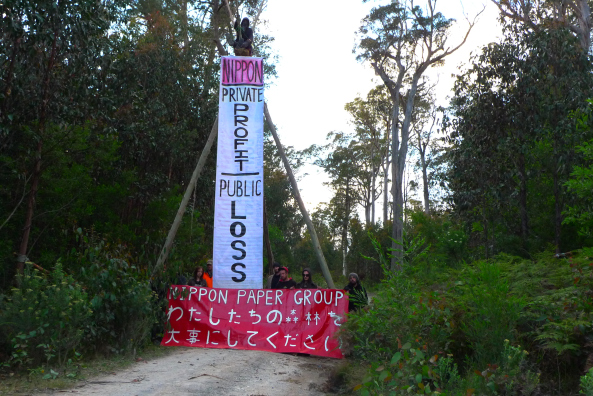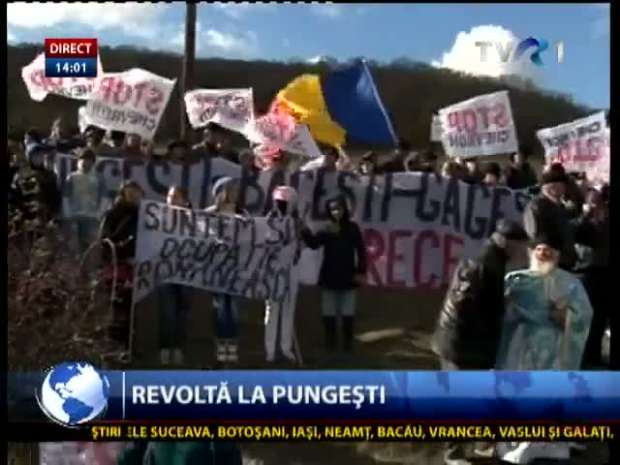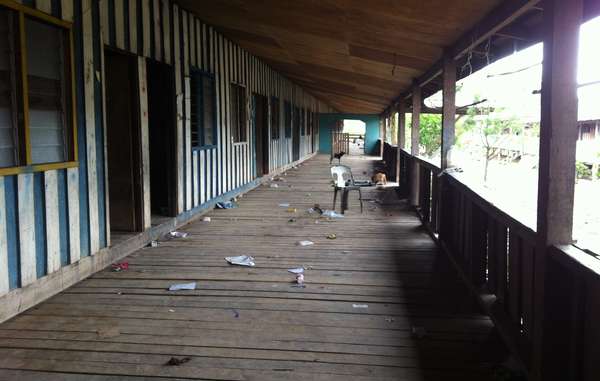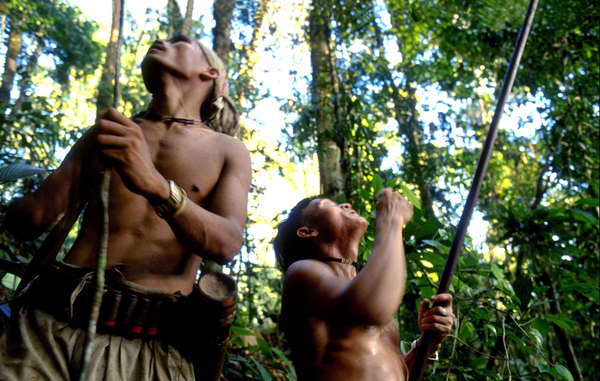11th Dec The Maya People of Sipacapa issued an international appeal for solidarity this past weekend, in the midst of ongoing protests against Goldcorp Inc.’s mining activities in San Marcos, Guatemala.
11th Dec The Maya People of Sipacapa issued an international appeal for solidarity this past weekend, in the midst of ongoing protests against Goldcorp Inc.’s mining activities in San Marcos, Guatemala.
The Maya began protesting with campesino communities on December 4,2013, setting up two separate blockades on the Inter-American Highway — at Kilometer 170 in Santa Catarina Ixtahuacán, Sololá and Kilometer 242 near Pajapita, San Marcos.
According to the appeal, issued by The Mayan Council Of Sipacapa on December 7, Goldcorp and its subsidiary EntreMares de Guatemala are violating a community decision to reject any mining exploitation in Sipacapa.
The Maya are now demanding the withdrawal of both the company’s personnel and its machinery from Sipacapa, and requesting ”that central government authorities respect the community consultation carried out in 2005.”
They are further demanding an end to any ongoing efforts to force them to accept the new mine as well as the presence of various government officials “To resolve this issue, since the only thing we seek is peace”, state the Maya People of Sipacapa, adding, “The presence of the mine is causing social conflict, on a family level and on a community level, and it is destroying our social harmony.”
In addition to their demands, the Maya People Of Sipacapa are asking “our sisters and brothers from other nations to accompany us in this struggle which [is] in benefit of all.”
Below, please find the December 7 Appeal from the The People Of Sipacapa, in English and Spanish. English translation by Rights Action.
The People Of Sipacapa, Via The Mayan Council Of Sipacapa, Informs:
- To all sisterly and brotherly peoples, national and international authorities, national and international social and human rights organizations;
- To the Ministry of Energy and Mines, the Ministry of the Environment and Natural Resources, the Ministry of the Interior; and
- To EntreMares (Goldcorp Inc.):
Sipacapa Already Said No To Mining Exploitation.
“Sipacapa Is Not For Sale”
In 2005, the population firmly rejected mining exploration and exploitation in its territory, as was documented in the acts of the community consultation carried out in good faith on June 18, 2005 in each community of the municipality.
Since that time, the community has continued to defend that position. The population does not want its land destroyed by metallic mining, which only leads to social contamination (conflict), environmental contamination, health problems, deterioration of wildlife and economic injustice, as we see in the sister municipality of San Miguel Ixtahuacán, department of San Marcos.
Nevertheless, on April 30, 2012, the Ministry of Energy and Mines – through its general director of mining – issued a mining exploration license to the company EntreMares de Guatemala (owned by Goldcorp Inc.), called the “Chocoyos” license, to exploit gold, silver, nickel, cobalt, chromium, copper, lead, zinc antimony and rare earth elements in an area of 23 square kilometers.
For these reasons, we have been protesting peacefully since December 4, 2013, to reject the presence of exploration machinery and personnel from EntreMares/ Goldcorp. We demand the withdrawal of this machinery and the company personnel from the territory of Sipacapa, and request that central government authorities respect the community consultation carried out in 2005.
We request and demand that they cease to force us to accept the presence of the EntreMares/ Goldcorp mine in Sipacapa. We continue to be intimidated by the presence of the National Civilian Police.
We also demand the presence of the departmental governor, the director of Energy and Mines, the Minister of Energy and Mines and the Human Rights Prosecutor. We request their presence in our municipality to resolve this issue, since the only thing we seek is peace. The presence of the mine is causing social conflict, on a family level and on a community level, and it is destroying our social harmony.
We ask our sisters and brothers from other nations to accompany us in this struggle which in benefit of all. Municipal authorities should not be promoting destructive projects.
Municipality of Sipacapa, San Marcos
December 7, 2013
 December 17th The UK government has announced that roughly 60% of the UK is now available to be licensed to fracking companies. After a brief “consultation” period it is likely that the licenses will be handed out to fraking companies in the first half of 2014. The licenses would cover the exploitation of both shale oil and gas and coal bed methane (CBM).
December 17th The UK government has announced that roughly 60% of the UK is now available to be licensed to fracking companies. After a brief “consultation” period it is likely that the licenses will be handed out to fraking companies in the first half of 2014. The licenses would cover the exploitation of both shale oil and gas and coal bed methane (CBM).
 December 17th The UK government has
December 17th The UK government has 
 12th December For the second day 40 conservationists have maintained a forest protest action at Stony Creek in East Gippsland. Police Search and Rescue arrived at the site this afternoon.
12th December For the second day 40 conservationists have maintained a forest protest action at Stony Creek in East Gippsland. Police Search and Rescue arrived at the site this afternoon. 12th December For the second day 40 conservationists have maintained a forest protest action at Stony Creek in East Gippsland. Police Search and Rescue arrived at the site this afternoon. They proceeded to tie-off cables connected to the tree sit, to release the logging machinery. Police climbed the tree-sitter’s tree, removing the platform and the protester’s personal belongings, including blankets, food and water. The tree-sitter remains perched on branches at the top of the tree. Two people are still at the top of tripods on the road, continuing to block access to log trucks. Logging contractors have began felling trees within the logging coupe.
12th December For the second day 40 conservationists have maintained a forest protest action at Stony Creek in East Gippsland. Police Search and Rescue arrived at the site this afternoon. They proceeded to tie-off cables connected to the tree sit, to release the logging machinery. Police climbed the tree-sitter’s tree, removing the platform and the protester’s personal belongings, including blankets, food and water. The tree-sitter remains perched on branches at the top of the tree. Two people are still at the top of tripods on the road, continuing to block access to log trucks. Logging contractors have began felling trees within the logging coupe. 10th Dec From
10th Dec From  9th December Protests against Chevron’s activity in Silistea – Pungesti, northeastern Romanian, area escalated on Saturday, December 6, triggering the American oil and
9th December Protests against Chevron’s activity in Silistea – Pungesti, northeastern Romanian, area escalated on Saturday, December 6, triggering the American oil and  9th December Protests against Chevron’s activity in Silistea – Pungesti, northeastern Romanian, area escalated on Saturday, December 6, triggering the American oil and gas company to suspend its activity on site.
9th December Protests against Chevron’s activity in Silistea – Pungesti, northeastern Romanian, area escalated on Saturday, December 6, triggering the American oil and gas company to suspend its activity on site. 9th Dec Members of the
9th Dec Members of the  9th Dec Members of the
9th Dec Members of the 
 8th December
8th December  8th December
8th December  8th Dec The
8th Dec The